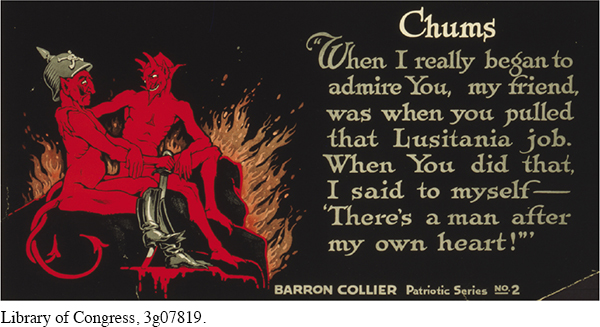The United States Enters the War
Step by step, the United States backed away from “absolute neutrality.” The consequence of protesting the German blockade of Great Britain but accepting the British blockade of Germany was that by 1916 the United States was supplying the Allies with 40 percent of their war materiel. When France and Britain ran short of money to pay for U.S. goods and asked for loans, Wilson argued that “loans by American bankers to any foreign government which is at war are inconsistent with the true spirit of neutrality.” But rather than jeopardize America’s wartime prosperity, Wilson allowed billions of dollars in loans that kept American goods flowing to Britain and France.
In January 1917, Germany decided that it could no longer afford to allow neutral shipping to reach Great Britain while Britain’s blockage gradually starved Germany. It announced that its navy would resume unrestricted submarine warfare and sink without warning any ship, enemy or neutral, found in the waters off Great Britain. Germany understood that the decision would probably bring the United States into the war but gambled that its submarines would strangle the British economy and allow German armies to win a military victory in France before American troops arrived in Europe. [[LP Photo: P22.02 “Chums”/

Resisting demands for war, Wilson continued to hope for a negotiated peace and only broke off diplomatic relations with Germany. Then, on February 25, 1917, British authorities informed Wilson of a secret telegram sent by the German foreign secretary, Arthur Zimmermann, to the German minister in Mexico. It promised that in the event of war between Germany and the United States, Germany would see that Mexico regained its “lost provinces” of Texas, New Mexico, and Arizona if Mexico would declare war against the United States. Wilson angrily responded to the Zimmermann telegram by asking Congress to approve a policy of “armed neutrality” that would allow merchant ships to fight back against attackers.
> CONSIDER CAUSE
AND EFFECT
What were the economic, political, and ideological factors influencing Wilson’s decision to go to war in Europe?
In March, German submarines sank five American vessels off Britain, killing 66 Americans. On April 2, the president asked Congress to issue a declaration of war. He accused Germany of “warfare against all mankind.” Still, he called for a “war without hate” and declared that America fought only to “vindicate the principles of peace and justice.” He promised a world made “safe for democracy.” On April 6, 1917, by majorities of 373 to 50 in the House and 82 to 6 in the Senate, Congress voted to declare war.
Wilson feared what war would do at home. He said despairingly, “Once you lead this people into war, and they’ll forget there ever was such a thing as tolerance. To fight you must be brutal and ruthless, and the spirit of ruthless brutality will infect Congress, the courts, the policeman on the beat, the man in the street.”
> QUICK REVIEW
Why did President Wilson fail to maintain U.S. neutrality during World War I?
Understanding the American Promise 3ePrinted Page 621
Section Chronology